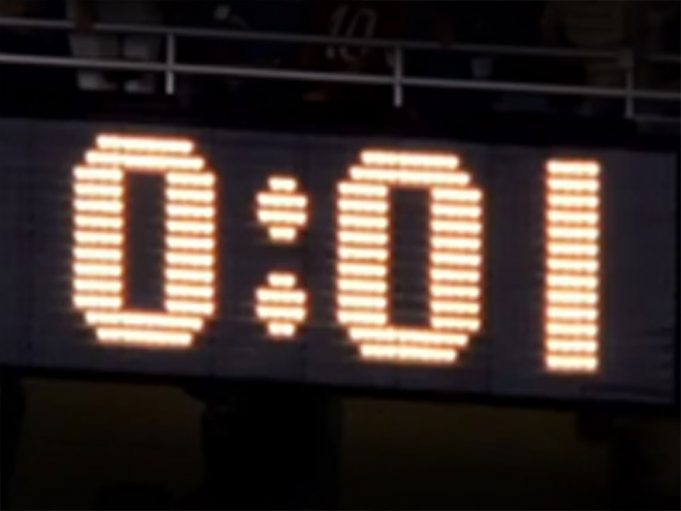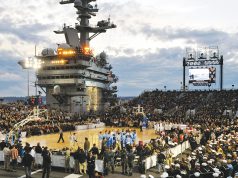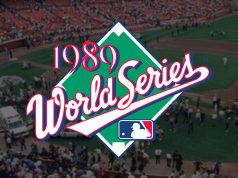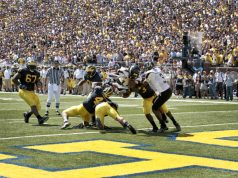Richie Powers recalls that the biggest call he had to make in his nearly 25-year NBA officiating career came at the Boston Garden on June 4, 1976. It was Game Five of the Boston Celtics-Phoenix Suns championship series, which was tied at two games apiece. Phoenix was clinging to a one-point lead with just over two seconds to play when Celtic great John Havlicek scored as time “expired” to give the home team a one-point victory. But had time really expired? The clock said it had.
“Naturally, all the fans thought Boston had won and they were running around in exaltation”, Powers recalls. “Unfortunately for them, the timekeeper got mixed up or caught up in all the excitement and he forgot to stop the clock when the shot went through the net.”
Powers was under the basket and wasn’t sure how much time, if any, was left. The game could have been over, perhaps without an argument from Phoenix coach John MacLeod. Powers later said he was told by MacLeod that the Suns would not have had an opportunity to win without Powers’ intervention.
Richie wasn’t trying to do Phoenix any favors, but when alternate official Bob Rakel told Powers that the timekeeper erred, Powers simply wanted to do what was right. With a capacity Boston Garden crowd of 15,320 fans cheering wildly for their beloved Celts, Powers, Rakel, and Don Murphy (the other working official) huddled to make a decision on the time remaining. “Nothing was automatic then, the clock had to be stopped and started manually,” Powers recalled. Rakel reasoned that there should be one second left since there were two seconds left when Havlicek’s shot was in the air and it would take one second for the ball to clear the net.
As the lead official, Powers agreed and ruled that there was one second left in the game. Suns’ guard (and current coach) Paul Westphal called a timeout, which turned out to be brilliant strategy. The Suns were out of timeouts and the excess timeout resulted in a technical foul against Phoenix. Celtics’ guard JoJo White made the resulting free throw, giving his team a two-point lead. “At that time,” Powers explained, “after a technical foul, the team entitled to the ball, in this case Phoenix, could make a throw-in from midcourt. That enabled Garfield Heard to spin and shoot a miraculous shot to tie the game.” Overtime!
A fan attacks Powers.
One fan was so incensed by the turn of events that he rushed out onto the court to assault Powers. “I was standing at midcourt with the ball between my legs when I saw this guy out of the corner of my eye, coming right at me. He hit me in the chest and I missed him with two punches. Then, we fell over and I landed on top of him. When we got up I remember a couple of Suns whacked the guy pretty good before security took him away… It was an incident that nearly ruined what may have been the greatest game ever played.”
Unhurt, Powers continued to ref. From start to finish, the game took three hours and eight minutes to play. Even as the third overtime wound down, with Boston leading by six and 31 seconds left, Westphal scored four quick points to cut the lead to two before JoJo White dribbled out the clock to put an end to the marathon. The final score: Boston 128, Phoenix 126.
Powers recalled that White was so tired during the second overtime that he sank to the floor while his team was shooting foul shots. “I understood what he was going through. He had played a lot and he was exhausted, but so was I. I didn’t think it looked good to allow him to sit on the floor so I told him he’d have to get up. I figured if I had to stand up all that time, so would he.”
In the first half of the contest, it looked like a blowout. “Boston led by as many as 22 points in the second quarter,” said Powers, “but Phoenix just never quit: They kept coming back and coming back. We were all exhausted, but the game got more and more exciting as it went along.”
Indeed, anybody who stopped watching the game on TV, thinking Boston would win easily, would have been surprised later. Phoenix fans who recall the event think the Suns spent all they had in that game and were consequently unable to come up with a similar effort in losing Game Six in less dramatic fashion, two days later, when Boston captured their 13th NBA championship, four games to two.
Powers is proud of the way he and Don Murphy handled the game. “Both teams knew that everything was going to be officiated correctly that night.” Powers worked the next season’s final series between Bill Walton’s Portland Trailblazers and Julius Erving’s Philadelphia 76ers, then retired in 1979.
Of the other oncourt official assigned to work the historic Boston-Phoenix game, Powers said: “Murphy was one of my favorite officiating partners. Ironically, he and the alternate official, Bob Rakel, went into business together in Cincinnati and even though Murphy is dead (heart attack, May 22, 1992, age 61), the business is still called Don Murphy Doors.”
After leaving the NBA, Powers worked as a basketball analyst for WABC-TV in New York before becoming involved in the U.S. Basketball League and the defunct Global Basketball League, as vice-president and director of officials, respectively.
What's Your Call? Leave a Comment:
Note: This article is archival in nature. Rules, interpretations, mechanics, philosophies and other information may or may not be correct for the current year.
This article is the copyright of ©Referee Enterprises, Inc., and may not be republished in whole or in part online, in print or in any capacity without expressed written permission from Referee. The article is made available for educational use by individuals.


















